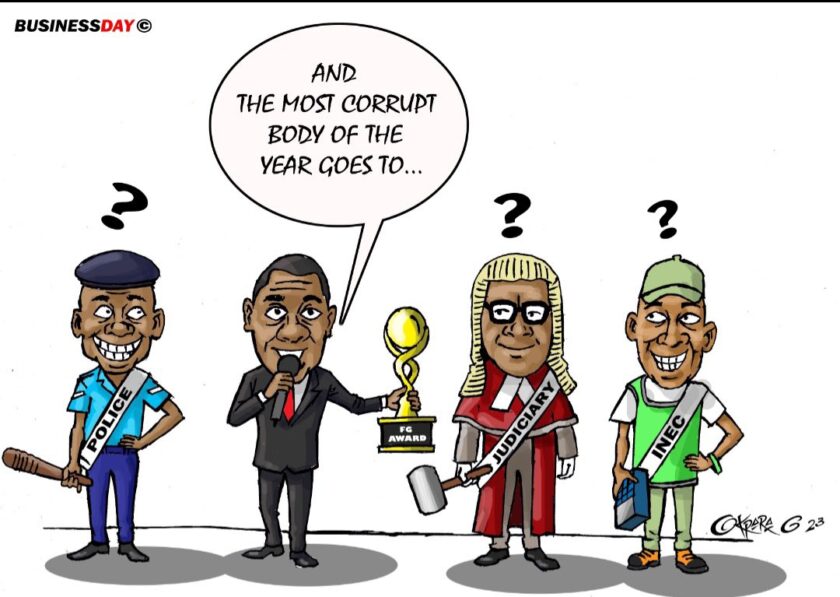A corrupt judge, said Samson Uwaifo, a retired justice of Nigeria’s Supreme Court, “is more harmful to the society than a man who runs amok with a dagger in a crowded street. While the man with the dagger can be restrained physically, a corrupt judge deliberately destroys the foundation of society”.
In January 2023, the Independent Corrupt Practices and other Related Offences Commission (ICPC) announced that 52 ministries, departments and agencies (MDAs) of government had declined to respond to the Ethics and Integrity Compliance Scorecard (EICS) deployed in 2022 by the ICPC, and were hence classified as ‘High Corruption Risk’.
Among those so classified were the Supreme Court, Court of Appeal and the National Judicial Institute.
“Failure to respond to such simple demands by ICPC for reviews or tools to improve operational practices may be symptomatic of a system deficit, impunity or a cover-up for fraud and administrative felonies. This calls for a systems study and review of the MDAs, and where necessary, investigation and other law enforcement interventions,” ICPC warned.
In December 2020, the ICPC said that the judicial sector led the Nigeria Corruption Index between 2018 and 2020. The commission further said that about N9,457,650,000 was offered and paid as bribes by lawyers to judges.
Overall, Bolaji Owasanoye, chairman of the ICPC said that “the justice sector had the highest level of corruption with a score of 63. The level of corruption in the justice sector was heightened by stupendously high amounts of money offered as bribes to judges by lawyers handling high electoral and other political cases.
“Follow-up discussions indicated that the cases of outright demand and offer of bribes are mostly linked to election matters.
READ ALSO :NNPP Applauds Atiku, Welcomes Merger Of Opposition Parties
“Money involved in the high-level corruption in this sector was categorised into money demanded, offered or paid. Demands are made by court officials, including judges, while lawyers or litigants make bribery offers and payments.
“The total amount of money reported by the justice sector respondents as corruptly demanded, offered and paid between 2018 and 2020 was N9,457, 650,000”.
According to the study, percentage of those most responsible for bribe for judgement cases were: Lawyers (27.17 %); litigants personally (21.96 %) court staff (clerks, registrars etc.)— (21.54 %); judges (16.88 % cent), government MDAs (7.37 %); no experience on the matter (3.06 %); chose not to say (1.01 %), and others 1.01 percent.
Bobby (not real name) works with a Federal Government parastatal. He had previously served as a personal assistant to a justice of the Supreme Court. He admits that he was involved in receiving bribes and inducements on behalf of his principal.
“It started when he became a judge of the Federal Court of Appeal,” he said, “and he invited me to work with him as his personal assistant. We had this discussion in Kaduna, and it was a long discussion about his expectations and my role. This included working with lawyers to receive bribes on his behalf as well as with litigants. They started from several millions and by the time we got to the Supreme Court, we were working with SANs who were offering the high side of tens of millions of naira”.
Bobby says bribes for favourable judgement are rampant in Nigeria’s judicial system. “It is a given that most election cases involve lawyers offering bribes to judges. Of course, there are a few judges who would not take bribes, but I can tell you that they are very few”.
In June 2022, Odein Ajumogobia, Nigeria’s former minister for energy and petroleum resources accused the law firm of one of the senior advocates of Nigeria (SAN) of professional misconduct in the $130 million Rivers State Government vs Saipem SPA, Saipem Contracting Nigeria Limited and Ors case.
One of the partners in the law firm had claimed in her letter to Saipem that her firm’s leading partner was close to Supreme Court and Court of Appeal judges and, “the presence of our lead partner in the matter will significantly switch things in favour of Saipem”.
In 2017, the Economic and Financial Crimes Commission (EFCC) preferred an 11-count charge bordering on perverting the course of justice and offering gratification to public officials against a senior advocate, Joseph Nwobike. The EFCC alleged that Nwobike offered gratifications to some judges of the Federal High Court and the National Industrial Court to influence them to act contrary to their official capacities.
In October 2016, Nigeria’s secret police, the State Security Service (SSS), raided the homes of several judges in six states of the federation arresting and detaining 15 of them.
During the raid, the SSS said it recovered a huge stash of money in local and foreign currencies. Seven judges were arrested, and have since been released on bail.
The National Judicial Council (NJC), the body responsible for recruiting and exercising disciplinary control over judicial officers, rejected a request to investigate the judiciary, citing separation of powers and rule of law.
The NJC also informed the SSS that it was not amenable to “invitations being extended to judicial officers by departments and agencies of government for any reason”.
Credit – businessDay
The democracy of Nigeria 🇳🇬 is at greatest risk with the rascality of the Judiciary……. So unfortunate that few Judges in Nigeria would now collect massive bribe and truncate the will of over 200M people…… Justice now is according to the highest bidder…… Justice for sale….The executive and the Judiciary are now in unholy marriage… Tụfịakwa!!!

